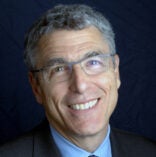As a New York City voter, I’m preparing to cast my ballot in the upcoming mayoral election. But as a congregational rabbi and now the head of the largest Jewish movement in North America, I’ve never told congregants for whom they should vote.
I won’t start now, despite the Trump administration’s misguided efforts to weaken the Johnson Amendment, the longstanding rule that bars congregations and their leaders from endorsing or opposing candidates from the pulpit. Keeping partisan politics out of our politically diverse congregations feels more essential than ever in today’s polarized climate.
I respect rabbinic colleagues who have added their names to the letter “A Rabbinic Call to Action: Defending the Jewish Future” — as more than 1,100 from across the country have now done. Similarly, I respect colleagues who have principled reasons for not signing on. The fact is that there is more than one way for rabbis to express moral clarity and to speak about urgent issues facing our community.
Addressing moral issues has always been part of the art of preaching sermons. And as always, clergy can do this during campaign season without crossing the line into electioneering.
As a rabbi, I am deeply committed to living Jewish values and looking at contemporary issues through the prism of Jewish tradition and values. Matters of Jewish safety and security are of paramount importance to me, especially now with rising incidents of antisemitism. Following the Anti-Defamation League’s report of a record-breaking 976 antisemitic incidents in New York City in 2024, the highest count in any U.S. city last year, this year has also seen an alarming increase in antisemitism including harassment, vandalism and physical violence.
Given these increasing threats to our community, we need a mayor who will work tirelessly to protect us. This includes making sure that the NYPD continues to provide extra protection for our community on Jewish holidays and at other moments of Jewish gathering.
I can attest that Zohran Mamdani is not lacking in empathy for the Jewish community’s anxiety over regular threats to our safety. In public interviews and in a personal meeting, I’ve heard him pledge to protect the Jewish community. But his many comments about the intersection of antisemitism and anti-Zionism — issues that are not synonymous but do overlap — have been problematic.
Expressing criticism of the Israeli government’s policies is not foreign to me or to many other ardent Zionists. However, denying Israel’s right to exist as both a Jewish and democratic state crosses the line from criticism of Israeli policy to a rejection of Israel and the 3,000-year-old identification of Judaism with Israel as the Jewish people’s homeland. And in an atmosphere where Israel is regularly and harshly demonized, Jewish safety is threatened.
Mamdani has been consistent in saying that he believes Israel has a right to exist as a state of all its citizens, but not as a Jewish state. This argument might sound tidy in a seminar; in the real world it is cause for grave concern. Given centuries of global antisemitism — from age-old accusations of deicide to the Inquisition to the Holocaust to Oct. 7 — as well as the many wars and terrorist attacks emanating from Israel’s neighbors over the last seven decades, the “one-state” solution Mamdani espouses would put the lives of the 7 million Israeli Jews at great risk and end Israel’s identity as the Jewish people’s homeland.
While this is a moment when our vulnerable Jewish community is rightfully lifting up the needs and dangers before us, our tradition forbids us from ignoring the many other compelling areas of vital concern for the Jewish community. Primary among them is addressing the many threats to the core pillars of our democracy that have given Jews the rights and freedoms that have allowed us to flourish in America and in New York City. These are the very pillars that promise hope for groups facing discrimination, barriers, and threats to their safety and well-being. Those priorities also include the moral responsibility to reverse the ever-widening gap between rich and poor New Yorkers.
Judaism has never been about caring only for our own community or just personal piety but rather, as the prophet Isaiah reminds us, a societal commitment to:
To let the oppressed go free;
To break off every yoke.
It is to share your bread with the hungry,
And to take the wretched poor into your home;
When you see the naked, to clothe him,
And not to ignore your own kin.”
— Isaiah 58:6-7
And when we are considering whom to elect as leaders, a candidate who has been morally compromised should not easily collect our votes. As I have questioned what Mamdani might do based on his statements, so too I question what Andrew Cuomo might do in light of past findings of his pattern of harassment, as documented in the New York Attorney General’s 2021 report. According to Psalm 15, a person of moral character is someone:
whose tongue is not given to evil;
who has never done harm to his fellow,
or borne reproach for [his acts toward] his neighbor;
who has never lent money at interest,
or accepted a bribe against the innocent. (Psalm 15:3, 5)
If you think the choice for mayor is simple, I respectfully suggest that you are not paying attention. I implore our Jewish community and all New Yorkers to carefully consider the many urgent issues our city faces before casting your vote. The stakes couldn’t be higher.
JTA has documented Jewish history in real-time for over a century. Keep our journalism strong by joining us in supporting independent, award-winning reporting.






